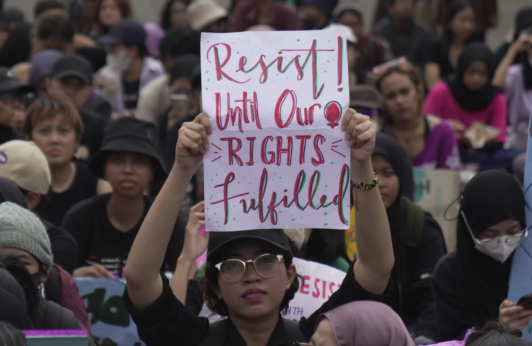
In countries around the globe Friday, women are on the march. In France, they are celebrating a major victory—the winning of a constitutional right to an abortion. From Manila to Kabul to Jakarta and points in between, they are demanding an end to gender-based violence and oppression and fighting for their rights as workers.
France inscribed the guaranteed right to abortion in its constitution Friday, a powerful message of support for women’s rights on International Women’s Day.
While abortion is a deeply divisive issue in the United States, it’s legal in nearly all of Europe and overwhelmingly supported in France, where it’s largely seen as a question of public health. French legislators approved the constitutional amendment on Monday in a 780-72 vote that was even backed by many far-right lawmakers.

The French constitutional amendment has been hailed by women’s rights advocates around the world, including places where women struggle to access birth control or maternal health care. French President Emmanuel Macron called it a “direct result” of the U.S. Supreme Court ruling in 2022 rescinding long-held abortion rights.
While some French women saw the step as a major win, others said that in reality, not every French woman has access to abortion.
“The government is destroying our health care system, many family planning clinics have closed,’’ Arya Meroni, 32, said at an annual “Feminist Night March” in Paris on the eve of International Women’s Day.
France has a persistently high rate of women killed by their partners and challenges remain in prosecuting sexual abuse against women by powerful celebrities and other men. French women also see lower pay and pensions—especially women who are not white.
The Soviet Union was the first country in the world to legalize abortion, in 1920. The measure was reversed in 1936, but a woman’s right to choice was restored in the USSR in 1955. Other socialist countries, including the German Democratic Republic, had strong laws protecting women’s reproductive rights.
The former Yugoslavia was the first nation in the world to inscribe the right to an abortion into its constitution, in 1974—beating France by 50 years.
Women and progressives are celebrating across France Friday, while IWD marches, protests, and conferences are being held in other cities—from Jakarta, Indonesia, to Mexico City and beyond.
In Copenhagen, the head of the Danish Trade Union Confederation, which has 1.3 million members, chafed at how differently women and men are treated in some areas. “Unfortunately, we still see sky-high pay differences, professions dominated by one sex, a gender-segregated labor market, harassment cases that primarily affect women, and a wide range of other equality problems,” Morten Skov Christensen said.
In Ireland, voters are deciding whether to change the constitution to remove passages referring to women’s domestic duties and broadening the definition of the family.
In Italy, where a neo-fascist female premier is in power, thousands of people marched in Rome to protest the government’s anti-woman policies and gender-based violence. The issue grabbed public attention after the particularly gruesome murder of a young woman as well as data showing more than half of the 120 women murdered in Italy last year were killed by their current or former partners.
At street rallies in Seoul, Korea, solidarity with the women of Palestine was a key theme. Organized by the Korean Confederation Trade Unions, protesters staged a die-in to show their support for Palestinian women killed in Israel’s ongoing genocidal war. Women workers also said they have an eye on next month’s parliamentary elections in South Korea and expressed hope that parties would prioritize gender equality.
Women in Afghanistan staged rare protests against harsh Taliban restrictions. The country’s religious rulers have banned girls and women from education above grade six and from most jobs. Females are also barred from public spaces like parks. A group of women gathered indoors in Kabul, holding up signs to hide their faces, and chanted, “No to gender apartheid” and “Afghanistan is hell for women.”
Protesters in Turkey are calling attention to violence against women, and rallies are expected in many cities. Last year, women braved an official ban on an IWD march in Istanbul and protested for about two hours before police used tear gas to disperse the crowd and detain dozens of people.

Since the beginning of this year, at least 71 women have been killed in Turkey. At least 403 women were killed in Turkey last year, most of them by current or former spouses and other men close to them, according to the We Will Stop Femicides Platform. Its secretary-general, Fidan Ataselim, said men “are violently trying to suppress the progress of women.”
Indonesian demonstrators demanded the adoption of the International Labor Organization’s conventions concerning gender equality and eliminating workplace violence and harassment. Labor rights groups in Thailand marched to the Government House to petition for better work conditions, and activists marching against violence in Manila, Philippines, were stopped by police near the presidential palace.
Officially recognized by the United Nations in 1977, International Women’s Day is a national holiday in about 20 countries, but not in the United States.
We hope you appreciated this article. At People’s World, we believe news and information should be free and accessible to all, but we need your help. Our journalism is free of corporate influence and paywalls because we are totally reader-supported. Only you, our readers and supporters, make this possible. If you enjoy reading People’s World and the stories we bring you, please support our work by donating or becoming a monthly sustainer today. Thank you!










